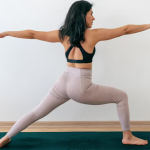At the time of writing this article about being open to change, the government has announced that social gatherings in the UK will be limited to six people [emits silent wail].
For many of us, this is going to be very hard to take, when most of us feel that we’re only just getting back to some kind of normality. Kids are going back to school, many of them for the first time in six months, people are heading back to offices and so on.
But if 2020 has taught us anything, it’s that everything that we took for granted as ‘normal’ can change overnight… Here’s how yoga can help us to come to terms with this, and even thrive.
Change is the only Constant
This truism was assigned to the Ancient Greek philosopher Heraclitus of Ephesus. But like all good truisms, there’s more to it than meets the eye.
As a child, the job of your parents is to make you feel safe and protected. The routines and rules of childhood are a way of making us feel that the world is a regular, non-chaotic place, where life is predictable.
As we grow up we realise (hopefully gradually) that this is not the case. Life is not regular, predictable, or safe. Change can happen suddenly, or gradually. But the only thing we can be certain of is that, eventually, everything changes.
It’s how we deal with this inevitable change that determines our resilience.
Why do we like routine?
Given this certain uncertainty, why do humans not like change?
There’s a reason why we have comfort food, comfort zones, and, less positively ‘being stuck in a rut’. Sometimes that rut feels like the safest place to be. And it’s also because our brains are hard-wired to find comfort in habits.
Deep in our primal brains are the basal ganglia (isn’t ‘ganglia’ such a great word), which neuroscientists have discovered play a key role in establishing our habitual patterns of behaviour. These ganglia are actually a cluster of nerve cell bodies (sounds less fun) that are involved in the development of emotions, memories and pattern recognition.
For example, we might decide one day to have a cup of tea before bed. This cup of tea makes us feel happy. The next night we remember the happy cup of tea and have another one. This then becomes a habitual pre-bed cup of tea.
For good or bad, these regular habits get so hard-wired that we barely think about them anymore. This is because the basal ganglia which trigger our routines are part of an automatic learning process, which means that they skip the more conscious part of our brains.
What happens when those routines change?
When faced with disruption to our regular routines, we have to re-think our weekly routines, which means that our conscious brains have to work harder. Basically, it’s tiring!
But the fabulous thing about the human brain is its plasticity. It can adapt, and the more we use this plasticity, the better we get at adapting to change.
After an initial shock to the system (which we should acknowledge and be gentler with ourselves), the brain adapts to the new routine and on we go!
Your yoga practice changes, too
If you scroll through Instagram you’d be forgiven for thinking that progress in yoga is a clear graph, with the hours of practice on the bottom, the effort involved on the other side, and then an upward trajectory of yoga practice. This isn’t helped by the ‘before’ and ‘after’ pictures often posted.
This is not to say that if you practice yoga you won’t get more flexible over time, but it’s not a straight upward line. There will be setbacks. The body changes. You have children. You move to a colder climate. You might even have had COVID and still be suffering from the after-effects.
Some days your poses will feel like they did when you first started – even if to outside eyes they don’t look like it.
This is because the yoga that happens IS NOT ALL ABOUT WHAT THE POSES LOOK LIKE. Yoga is about our understanding, intelligence, and sensitivity to the body increasing over time, and instead of forcing the body into the shape of the pose, we might just go to the point where we feel a gentle stretch.
How Yoga can teach us to be receptive to Change
The practice of yoga teaches us to deal with each task in the day as it arises, and then to put it down.
So says B K S Iyengar in his book Light on Life. Through the practice of yoga, we can learn that we need BOTH the routine of our daily practice, AND the adaptability to be sensitive to each practice as a unique moment.
Because no one is saying that routine is bad – we need routines. But if we come to rely solely on our habitual mode of being, we won’t be ready to accept change when it happens. Plus habitual practice is what leads to injury through thoughtless repetition. Intelligent practice means that we engage and focus on our practice in order to develop.
And as we do in yoga, so we do in life.
Join us next week to celebrate the seasonal change with Josh 🍂













